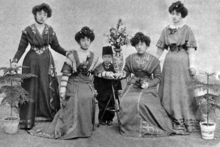Adile Sultan (daughter of Şehzade Selaheddin)
Adile Sultan (Ottoman Turkish: عادله سلطان, "justice, fairness"; 10 February 1887 – 6 December 1973) was an Ottoman princess, the daughter of Şehzade Mehmed Selaheddin, son of Sultan Murad V. Her mother was Tevhide Zatıgül Hanım.
| Adile Sultan | |||||
|---|---|---|---|---|---|
 Adile Sultan (first from left) in 1907 | |||||
| Born | 10 February 1887 Çırağan Palace, Constantinople, Ottoman Empire (present day Istanbul, Turkey) | ||||
| Died | 6 December 1973 (aged 86) Paris, France | ||||
| Burial | |||||
| Spouse | Faik Bey
(m. 1911; div. 1913)Moralizade Selaheddin Ali Bey
(m. 1914; died 1918) | ||||
| Issue | Second marriage Nilufer Hanımsultan | ||||
| |||||
| Dynasty | Ottoman | ||||
| Father | Şehzade Mehmed Selaheddin | ||||
| Mother | Tevhide Zatıgül Hanim | ||||
| Religion | Sunni Islam | ||||
Early life
editAdile Sultan was born on 10 February 1887 in the Çırağan Palace.[1] Her father was Şehzade Mehmed Selaheddin,[2] son of Murad V and Reftarıdil Kadın. Her mother was Tevhide Zatıgül Hanım,[2] daughter of Ibrahim Bey and Hanım.[3] She had two older full sisters, Celile Sultan and Rukiye Sultan, a younger full brother, Şehzade Mehmed, stillborn, and a younger full sister, Emine Atiye Sultan. She spent her early years in confinement in the Çırağan Palace, which at the time served as a prison for Murad V, deposed in 1876 by his half-brother Abdülhamid II, and his entire family. The confinement ended with Murad V's death in 1904.[3][4]
Marriages
editHer first husband was Faik Bey.[5] They married on 15 May 1910 in the Göztepe Palace. They did not have children and divorced in 1913.[1] Her second husband was Moralizade Selaheddin Ali Bey.[6] He was the son of Moralizade Mehmed Ali Bey[7] and Zehra Aliye Hanım.[8] They married on 3 April 1914 in the Göztepe Palace.[1][9] Their only child, a daughter, Nilüfer Hanımsultan,[10] was born on 4 January 1916. Adile was widowed at Ali Bey's death in December 1918.[1]
Philanthropy
editIn about 1911 the Kadıköy (Osmanlı) Fukaraperver Cemiyeti Hanımlar Şubesi was established under the patronage of Adile Sultan. It provided food, medicines and clothes to orphans, widows and old and disabled women. It also provided clothing for the children of two schools and gave a breakfast consisting of a bowl of soup and a slice of bread to more than a hundred persons every day. She was also the patron of the Müdafaa-i Milliye Cemiyeti Kadıköy (Merkezi) Hanımlar şubesi (Women's Branch of the (Central) Kadıköy National Defense Organization).[11]
Life in exile
editAt the exile of the imperial family in March 1924, she and her daughter settled in France, taking up residence in the Mediterranean city of Nice.[12] In 1931, her daughter married Moazzam Jah, younger son of Mir Osman Ali Khan, Nizam of Hyderabad,[13] after which she traveled to India with her to help her settle in.[14] Niloufer divorced Moazzam in 1952, returned to France and shared a flat with Adile in Paris.[14]
Death
editAdile died on 6 December 1973 in Paris, France,[1][2] and was buried in Bobigny cemetery.[15]
Honours
edit- Order of Medjidie, Jeweled[6]
- Order of Charity, 1st Class[6]
- Navy Medal in Gold[6]
Issue
edit| Name | Birth | Death | Notes |
|---|---|---|---|
| By Moralizade Selaheddin Ali Bey (married 3 April 1914; 1885 – 26 December 1918)[1] | |||
| Nilufer Hanımsultan | 4 January 1916 | 12 June 1989 | Born in Göztepe Palace; Married twice without issue; Died in Paris, France, and buried there |
In literature
edit- Adile Sultan is a character in Ayşe Osmanoğlu's historical novel The Gilded Cage on the Bosphorus (2020).[16]
Ancestry
edit| Ancestors of Adile Sultan (daughter of Şehzade Selaheddin) | |||||||||||||||||||||||||||||||||||||||||||||||||||||||||||||||||||||||||||||||||||||||||||||||||||||||||||||||||||||||||||||||||||||||||||||||||||||||||||||||||||||||||||||||||||||||||||||||||||||||||||||||||||||||||||||||||||||||||||||||||||||||||||||||||||||||||
|---|---|---|---|---|---|---|---|---|---|---|---|---|---|---|---|---|---|---|---|---|---|---|---|---|---|---|---|---|---|---|---|---|---|---|---|---|---|---|---|---|---|---|---|---|---|---|---|---|---|---|---|---|---|---|---|---|---|---|---|---|---|---|---|---|---|---|---|---|---|---|---|---|---|---|---|---|---|---|---|---|---|---|---|---|---|---|---|---|---|---|---|---|---|---|---|---|---|---|---|---|---|---|---|---|---|---|---|---|---|---|---|---|---|---|---|---|---|---|---|---|---|---|---|---|---|---|---|---|---|---|---|---|---|---|---|---|---|---|---|---|---|---|---|---|---|---|---|---|---|---|---|---|---|---|---|---|---|---|---|---|---|---|---|---|---|---|---|---|---|---|---|---|---|---|---|---|---|---|---|---|---|---|---|---|---|---|---|---|---|---|---|---|---|---|---|---|---|---|---|---|---|---|---|---|---|---|---|---|---|---|---|---|---|---|---|---|---|---|---|---|---|---|---|---|---|---|---|---|---|---|---|---|---|---|---|---|---|---|---|---|---|---|---|---|---|---|---|---|---|---|---|---|---|---|---|---|---|---|---|---|---|---|---|---|---|
| |||||||||||||||||||||||||||||||||||||||||||||||||||||||||||||||||||||||||||||||||||||||||||||||||||||||||||||||||||||||||||||||||||||||||||||||||||||||||||||||||||||||||||||||||||||||||||||||||||||||||||||||||||||||||||||||||||||||||||||||||||||||||||||||||||||||||
References
edit- ^ a b c d e f Adra, Jamil (2005). Genealogy of the Imperial Ottoman Family 2005. pp. 19–20.
- ^ a b c Brookes, Douglas Scott (2010). The Concubine, the Princess, and the Teacher: Voices from the Ottoman Harem. University of Texas Press. p. 278. ISBN 978-0-292-78335-5.
- ^ a b Eldem, Edhem (2018). The harem seen by Prince Salahaddin Efendi (1861-1915). Searching for women in male-authored documentation. pp. 22–23, 34.
- ^ Koçu, Reşat Ekrem; Sağlam, Osman Ferid (1911). Musavver nevsâl-i Osmanî (in Turkish). Marmara University. pp. 66–67. hdl:11424/48517. OCLC 850834461.
- ^ Salnâme-i Devlet-i Âliyye-i Osmanîyye, 1328 Sene-i Maliye, 67. Sene. Selanik Matbaası. 1912. p. 56.
- ^ a b c d Salnâme-i Devlet-i Âliyye-i Osmanîyye, 1333-1334 Sene-i Maliye, 68. Sene. Hilal Matbaası. 1918. pp. 72–73, 76–77.
- ^ "Makber'den Çankaya'ya". takvim.com.tr (in Turkish). 2012-10-19. Retrieved 2021-04-22.
- ^ Mehmet Nermi Haskan (2001). Yüzyıllar boyunca Üsküdar. Üsküdar Belediyesi. p. 689. ISBN 978-975-97606-2-5.
- ^ Vâsıb & Osmanoğlu 2004, p. 51.
- ^ Bardakçı 2017, p. 125.
- ^ Os, Nicolina Anna Norberta Maria van (31 October 2013). Feminism, Philanthropy and Patriotism: Female Associational Life in the Ottoman Empire. Leiden University Institute for Area Studies (LIAS), Faculty of Humanities, Leiden University. pp. 328 and n. 89.
- ^ Vâsıb & Osmanoğlu 2004, p. 95.
- ^ Bardakçı 2017, p. 123.
- ^ a b Khan, Elisabeth (2019-12-23). "Ottoman Princesses in India (2). Part two: Princess Niloufer, the first…". Medium. Retrieved 2021-04-22.
- ^ PAZAN, İbrahim (2014-12-18). "HANEDAN NEREDE ÖLDÜ NEREYE GÖMÜLDÜ?". ibrahimpazan.com (in Turkish). Retrieved 2021-04-22.
- ^ "May I Introduce Sultan Murad V's granddaughters", ayseosmanoglu.com, 3 April 2020, retrieved 22 April 2021
Sources
edit- Vâsıb, A.; Osmanoğlu, Osman Selaheddin (2004). Bir şehzadenin hâtırâtı: vatan ve menfâda gördüklerim ve işittiklerim. Yapı Kredi Yayınları. YKY. ISBN 978-975-08-0878-4.
- Bardakçı, Murat (2017). Neslishah: The Last Ottoman Princess. Oxford University Press. ISBN 978-9-774-16837-6.